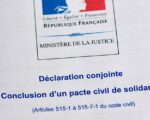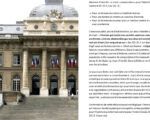>> Supreme Court agrees to hear same-sex marriage cases
Il y a quelques jours, elle avait accepté de se saisir du sujet. Quatre couples de même sexe avaient déposé un recours car ils souhaitaient voir leur mariage reconnu dans des Etats qui ne l’autorisaient pas.
La Cour suprême des Etats-Unis a annoncé vendredi qu’elle allait décider si les couples homosexuels pouvaient se marier partout dans le pays. Selon le site d’information Mother Jones, il s’agit de définir si le mariage est un droit constitutionnel ou pas.
La plus haute juridiction s’est saisie de quatre recours de couples homosexuels qui veulent pouvoir se marier ou voir leur mariage reconnu dans l’Ohio (nord), le Michigan (nord), le Tennessee (sud) et le Kentucky (centre-est), quatre Etats qui interdisent le mariage gay. Il y a quelques jours, la Cour suprême avait accepté de se saisir du sujet.
Elle a octroyé une audience de deux heures et demie pour entendre les arguments des parties sur l’interprétation du 14e amendement de la Constitution au sujet du mariage gay. Cet amendement affirme la nécessité de garantir l’égale protection de tous.
 Au cours d’une audience programmée pour la deuxième quinzaine d’avril, les neuf juges se poseront deux questions : «Le 14e amendement requiert-il d’un Etat qu’il autorise le mariage entre deux personnes de même sexe ? Le 14e amendement requiert-il d’un Etat qu’il reconnaisse un mariage entre deux personnes de même sexe si leur mariage a été légalement autorisé et célébré en dehors de l’Etat ?», selon le document remis à la presse.
Au cours d’une audience programmée pour la deuxième quinzaine d’avril, les neuf juges se poseront deux questions : «Le 14e amendement requiert-il d’un Etat qu’il autorise le mariage entre deux personnes de même sexe ? Le 14e amendement requiert-il d’un Etat qu’il reconnaisse un mariage entre deux personnes de même sexe si leur mariage a été légalement autorisé et célébré en dehors de l’Etat ?», selon le document remis à la presse.
La Cour suprême avait déjà, fin juin 2013, invalidé une loi américaine stipulant que le mariage était réservé à un homme et une femme. Elle avait de facto ouvert les droits fédéraux à la retraite, à la succession ou aux abattements fiscaux à tous les couples mariés, qu’ils soient hétérosexuels ou homosexuels.
Depuis cette décision historique, le mariage gay avait poursuivi son avancée spectaculaire aux Etats-Unis, dans les esprits et dans les textes, devenant légal dans neuf à 36 Etats sur 50, ainsi que dans la capitale fédérale Washington. Mais il reste proscrit dans quatorze Etats. Dans les quatre Etats qui ont fait appel à la Cour suprême, une cour d’appel avait jugé pour la première fois l’illégalité du mariage homosexuel. La Cour suprême devrait rendre son avis d’ici fin juin.
>> The U.S. Supreme Court today agreed to hear a challenge to Michigan’s 2004 same-sex marriage ban brought by two Hazel Park nurses, setting the stage for what could be a national precedent on a question that continues to divide the country.
The court announced its decision to hear the Michigan case along with challenges to same-sex marriage bans in Kentucky, Ohio and Tennessee following a closed-door judicial conference to decide which cases it would take up. Arguments before the court are expected the week of April 27 with a ruling likely by the end of June.
If the justices find in favor of the nurses and the other petitioners, it could reverse same-sex marriage bans across the U.S. and settle contradictory rulings in lower courts. A ruling in favor of the bans could deal a setback to efforts to recognize same-sex marriages, which have scored recent victories in courthouses and statehouses across the U.S.
« We are optimistic the justices will see right through the flawed and deceptive arguments that people standing on the wrong side of history, like Michigan Attorney General Bill Schuette, will once again try to present, » said Emily Dievendorf, executive director of Equality Michigan, an advocacy group representing gays, lesbians and the transgender community.
The gay marriage cases the Supreme Court will consider
Thirty-six states and Washington, D.C. recognize same-sex marriages. Fourteen states, including Michigan, do not.
April DeBoer and Jayne Rowse, who have four adopted children between them, brought the case, which asks if the state’s ban, approved by 59% of voters in 2004, violates the due process and equal protection clauses of the U.S. Constitution’s 14th Amendment.
The marriage ban was upheld by the 6th U.S. Circuit Court of Appeals in November, reversing an earlier decision by U.S. District Court Judge Bernard Friedman overturning it. On Thursday, a federal judge in Detroit ruled that the state must recognize 300 same-sex marriages performed during a brief window between Friedman’s ruling and a stay put in place by the Sixth Circuit.
« We are now that much closer to being fully recognized as a family, and we are thrilled, » DeBoer said after the grant by the Supreme Court was announced.
« Our families, communities and the schools all see us as a family, » added Rowse. « We juggle our jobs and a houseful of children and wouldn’t have it any other way. Soon, we hope to have the same recognition and share the same protections and responsibilities as all other families. »
In deciding the case, the Supreme Court could decide whether the question of defining marriage is one to be resolved by the states or if constitutional protections require marriage equality for all. In his earlier brief, Schuette — who did not oppose the Supreme Court taking up the case — argued that the will of the voters should be the final word.
In 2013, the court gave gay rights advocates a victory in U.S. vs. Windsor when it invalidated parts of the federal Defense of Marriage Act and said Congress couldn’t treat legally married same-sex couples differently than opposite-sex couples without violating constitutional protections. But it declined to rule on the constitutionality of state bans, even as some lower federal courts ruled against them.
Responding to the decision today, Schuette refrained from arguing any legal points, saying that the case « involves people of good will, sincerely motivated, on both sides. »
« All of Michigan’s voters, as well as the citizens of our nation, will be well served by the court’s decision to decide this case, » he said. « I am pleased that the Supreme Court has chosen to review this case, so that important issues involving the fundamental institution of marriage, our Constitution and the rights of voters will be decided. »
Michigan’s attorney general wasn’t as reserved in his earlier response to the court when he said the the case comes down to a simply matter of « who decides » the legality of same-sex marriages, a court’s interpretation of the Constitution or the individual states.
« The history of our democracy demonstrates the wisdom of allowing the people to decide important issues at the ballot box, rather than ceding those decisions to unelected judges, » he wrote, touching on the main issue motivating the 6th Circuit’s ruling upholding the ban.
Schuette also pointedly noted that the Supreme Court just last year in another Michigan case upheld a state ballot ban on the use of race as a factor in university admissions decisions. In that ruling, the majority said it was « demeaning … to presume the voters are not capable of deciding an issue of … sensitivity. »
Arguing for the Supreme Court to take up the case, DeBoer and Rowse’s lawyers said marriage equality is a matter of fairness for gay and lesbian couples and their children.
« The bans deny children in same-sex couple families the dignity, status, stability and security enjoyed by the children of married opposite-sex couple parents, and they exact a harsh practical toll by depriving them of multiple substantial material benefits. … The bans are harming children legally, economically, socially and psychologically, » the couple said in their request to the Supreme Court.
In granting review of the case today, the court consolidated the four cases and limited petitioners’ arguments to two questions: whether the 14th Amendment requires a state to license marriages between people of the same sex and whether it also requires a state to recognize same-sex marriages lawfully performed in other states.
The two sides of the questions will have a total of 90 minutes to argue the first question, and an hour to argue to second. Petitioners’ written briefs are to be filed by Feb. 27, with respondents’ briefs due April 17.
AFP


















